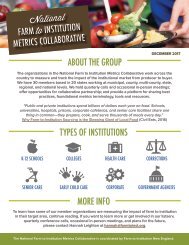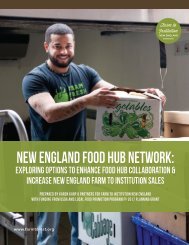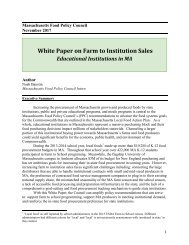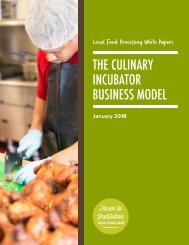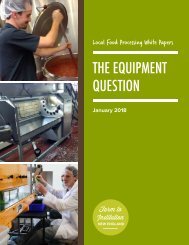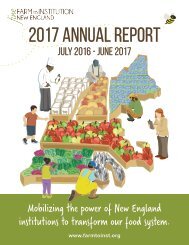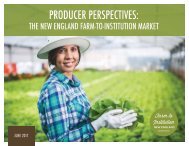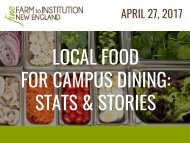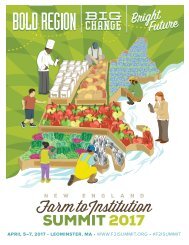FINE Workforce Dev White Paper
Create successful ePaper yourself
Turn your PDF publications into a flip-book with our unique Google optimized e-Paper software.
chosen for flavor and freshness rather than uniformity and shelf life. On the face of it, the challenges in<br />
making this transition are daunting. As Albert Einstein once said, however, “In the middle of difficulty<br />
lies opportunity.” Increasing the capacity of the food sector workforce can have many benefits; to<br />
businesses, workers, and the broader economy.<br />
Consumer demand for local foods is strong and growing. According to research from Packaged Facts,<br />
“local foods generated $12 billion in sales in 2014” and are anticipated to “grow faster than the annual<br />
pace of total food and beverage sales to approach $20 billion in 2019” (Packaged Facts). Companies<br />
responding to this trend can seize an advantage, especially in the increasingly competitive markets<br />
for higher education and health care food service. Some leading companies have realized this and are<br />
acting accordingly. For example Sodexo, one of the largest dining services providers, in 2013 signed<br />
a supply chain transparency agreement with Real Food Challenge (RFC). 1 More recently the company,<br />
which serves some 34,000 meals in Vermont each day, hired Anne Rowell, formerly program manager<br />
of the Center for an Agricultural Economy in Hardwick, VT, to direct the company’s “Vermont First” local<br />
food purchasing initiative (Sodexo).<br />
The impacts of shifting to greater local sourcing can be far reaching. If the culinary workforce is<br />
unionized, for example, the need to upgrade skills to better work with local produce can trigger job<br />
reclassification and a new round of collective bargaining. Workers with greater training are better<br />
positioned to advance, either within the current business, or by leveraging their skills to find other<br />
employment. Investing in workforce development thus not only allows businesses to compete more<br />
effectively by responding to the demand for local food, it creates a pool of better-trained workers,<br />
Vermont Food Venture Center<br />
1 RFC is a national student organization at 300+ colleges with the goal to “shift $1 billion of existing university food<br />
budgets away from industrial farms and junk food and towards local/community-based, fair, ecologically sound and humane<br />
food sources” by 2020 (RFC).<br />
WORKFORCE DEVELOPMENT: A CHALLENGING OPPORTUNITY<br />
5




